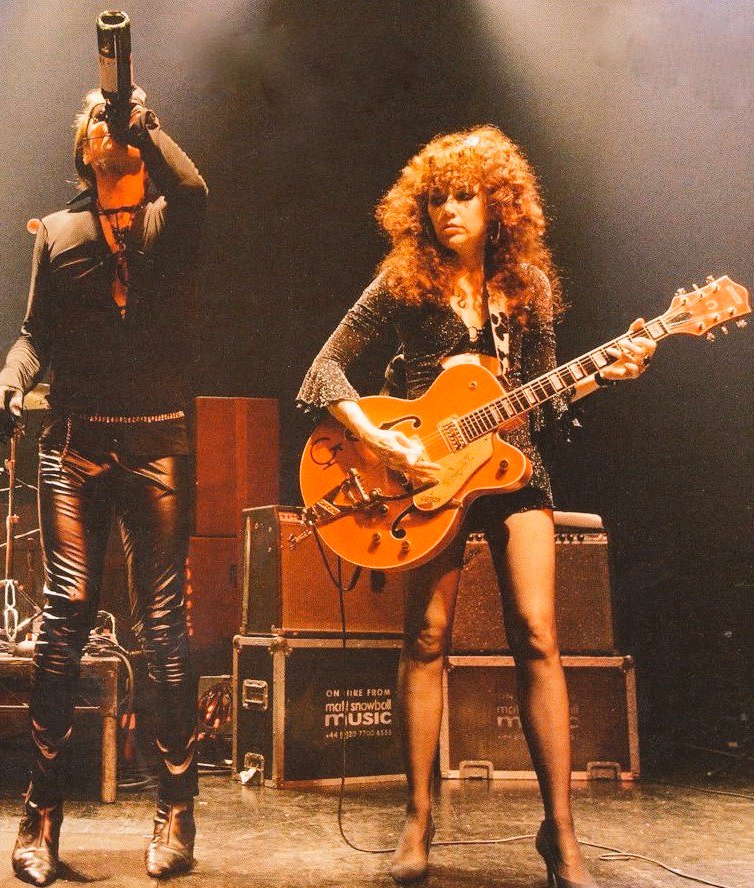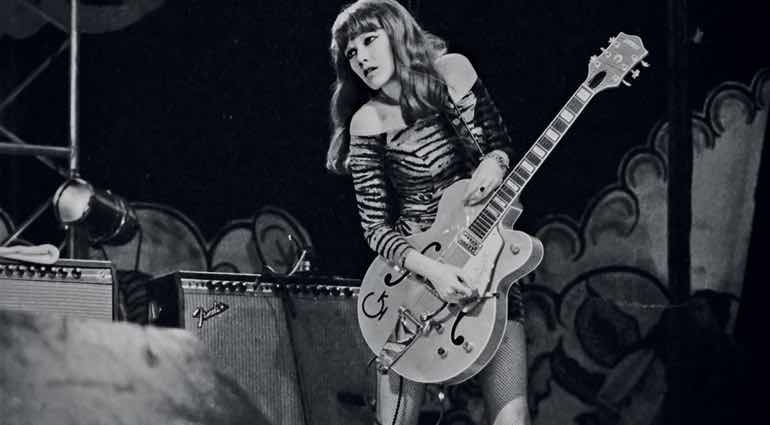Exploring Poison Ivy’s Guitar Mastery in The Cramps. Poison Ivy, the iconic guitarist of The Cramps, is renowned for her unique sound that combined punk’s raw energy with a retro rockabilly vibe. Her distinctive approach to guitar equipment and music production played a crucial role in shaping the band’s signature sound.
Poison Ivy
Poison Ivy Rorschach, born Kristy Wallace, is an iconic figure in the world of punk and psychobilly music, best known as the guitarist for The Cramps.

The Cramps, formed in the 1970s and emerged from the burgeoning New York punk scene and quickly became known for their unique blend of punk, rockabilly, and horror film aesthetics.
Her guitar playing, style, and image were all carefully curated and she was the driving force of the band. Her influence on music resonates throughout many genres and she is name-checked by many influential guitarists.

The Cramps
Kristy Wallace was born in 1953 in Sacramento, California. She developed an early interest in music, influenced by the rock and roll of the 1950s and 1960s.
Her journey into the world of punk rock began when she met Erick Purkhiser, also known as Lux Interior, at Sacramento State University. The meeting between Wallace and Purkhiser, both with a deep appreciation for vintage music and culture, laid the foundation for what would become The Cramps.
Psychobilly
After moving to New York in the mid-1970s, Wallace and Purkhiser formed The Cramps. The band was a part of the early CBGB punk rock movement but stood out due to its unique sound and image. Poison Ivy, as Wallace became known, was instrumental in shaping the band’s distinctive style, which blended punk energy with the twang of rockabilly and the eerie charm of old horror movies.
Poison Ivy’s guitar playing was central to The Cramps’ sound. Her style was raw, energetic, and heavily influenced by early rock and roll guitarists. She often played a hollow-body Gretsch guitar, contributing to the band’s signature reverberated sound. The Cramps are credited with pioneering the genre of psychobilly, a fusion of punk and rockabilly, and Poison Ivy’s guitar work was a major influence on subsequent bands in the genre.
Poison Ivy’s contribution to music extends beyond her guitar playing. She was also involved in the songwriting process, studio production, and the visual aspect of The Cramps, contributing to the band’s enduring legacy in the world of alternative music.
Away from the stage, Kristy Wallace maintains a relatively private life. Her partnership with Lux Interior was both a romantic and creative collaboration, with the two sharing a deep connection until his passing in 2009 at age 62.
Ivy’s Guitar Equipment
Poison Ivy is most famously associated with her Gretsch guitars, which were central to her distinctive sound. Among her collection, the Gretsch 6120, a classic hollow-body guitar, stands out.
This model, known for its bright, punchy tone, became synonymous with Poison Ivy’s style. The hollow body of the guitar contributed to a natural reverb effect, perfect for the echo-laden, atmospheric sound of The Cramps.
Her preferred strings tended to be D’Addario XL115 (.011-..049).
1. Gretsch 6120: Ivy’s guitar of choice was the ’58 Gretsch 6120, acquired in 1985. This semi-hollow body electric guitar is known for its rich, full-bodied sound, contributing significantly to the band’s vintage tone
2. Gibson ES-295: Among her collection, Ivy also used a Gibson ES-295, another semi-hollow body guitar known for its versatility and warm tone
3. Fender Pro Reverb Amplifiers: For amplification, Ivy relied on original blackface Fender Pro Reverb amps. She often used two of these onstage, one as a backup, with configurations including a 2×12 and a 1×15 setup
4. Other Guitars: Ivy’s gear also included a Danelectro Longhorn Guitarlin, a Canadian-made Bill Lewis 24-fret guitar, an Ampeg Dan Armstrong Plexi Electric Guitar, and a National Newport Val-Pro 88, showcasing her preference for unique and visually striking instruments.
5. Effect Pedals: Ivy used a Univox Super Fuzz pedal and a Maxon AD-80 delay for slapback, enhancing the band’s psychobilly sound with atmospheric effects. She was also spotted using a Fulltone Tremolo pedal on occasion.

Studio Gear
The Cramps’ music production style was characterized by a raw and minimalist approach. Ivy often used different amps for recording than for live performances. You’ll know The Cramps sound as soon as you hear it, and this sound was no accident. Ivy knew exactly what she was doing.
In the studio, she preferred small amps like the Valco amp with a 10″ speaker and Allen amps (including Allen Accomplice and Allen Old Flame) for their overdrive and tone, rather than the larger Fender Pro Reverbs used live.
Ivy’s approach to playing differed significantly between live performances and studio recordings. Live performances were about being loud and spontaneous, capturing the raw energy of the moment. In contrast, studio recordings were about capturing the essence of the music in a more controlled environment, ensuring the emotion and intent of the performance were preserved.
Their recordings often have a raw, unpolished quality, which has become a hallmark of their sound and a significant influence on the lo-fi and garage punk genre.
The Cramps Tracks
Below are some suggested tracks that give a great example of The Cramps sound, we have given a few suggestions as to how Ivy may have achieved the guitar tones for each track.
1. Human Fly: This track showcases Ivy’s use of her Bill Lewis guitars, (though she later moved to the Gretsch 6120), delivering a gritty and reverberating sound that became a hallmark of The Cramps’ style

2. Goo Goo Muck Featured on the album “Psychedelic Jungle,” this song likely features the Gibson ES-295, complementing the track’s swampy, haunting vibe

3. Can Your Pussy Do the Dog?: From the album “A Date With Elvis,” this track exemplifies Ivy’s raw and powerful guitar work, likely featuring her mainstay Gretsch 6120

4. Bikini Girls with Machine Guns: Appearing on the album “Stay Sick,” this track is an excellent example of Ivy’s use of fuzz and slapback effects, creating a distinctive and energetic sound

Poison Ivy’s Legacy
Poison Ivy’s choice of guitar equipment and her approach to music production significantly influenced The Cramps’ distinctive sound.
From her iconic Gretsch 6120 to her use of unique effect pedals, her legacy in the music world is marked by a blend of vintage style and punk sensibility. Her impact is felt not only in the psychobilly genre but also in the broader punk and alternative music scenes, where her innovative approach to guitar playing continues to inspire musicians.
She has the swagger of Link Wray on Rumble and a unique guitar tone all of her own. She wears her influences like a badge of honor and makes bad music for bad people.
Video





This article contains affiliate links to Thomann that help finance the running costs of GuitarBomb. If you buy something through these links, we will receive a small commission. Don’t worry as you pay the exact same price, and it costs you no extra to use these affiliate links for your purchases.
Main Image – “photo copyright Demed L’Her 1992, IG @ooplaboom”
https://www.instagram.com/p/CV05EduDUD9/

